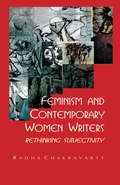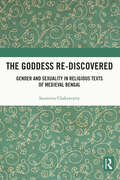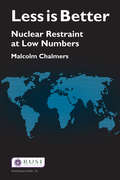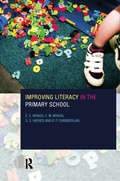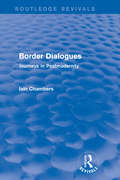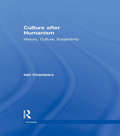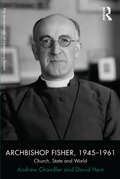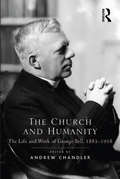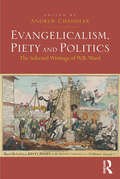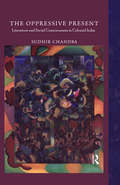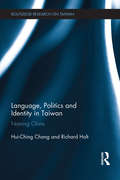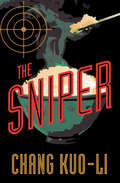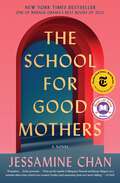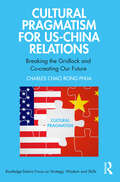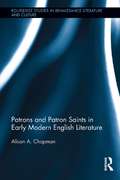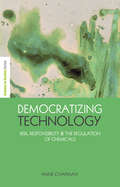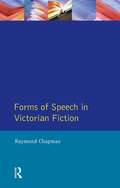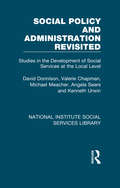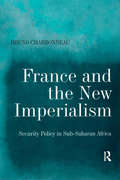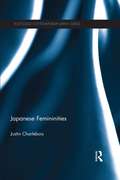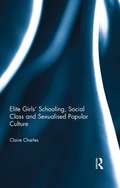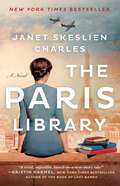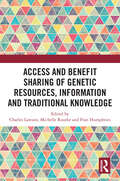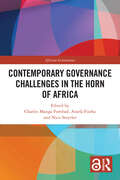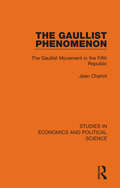Special Collections
Benetech’s Global Certified Accessible Titles
Description: Benetech’s GCA program is the first independent third-party EPUB certification to verify ebook accessibility. By creating content that is born accessible, publishers can meet the needs of all readers. Learn more: https://bornaccessible.benetech.org/
- Table View
- List View
Feminism and Contemporary Women Writers
by Radha ChakravartyThis book attempts to deal with the problem of literary subjectivity in theory and practice. The works of six contemporary women writers — Doris Lessing, Anita Desai, Mahasweta Devi, Buchi Emecheta, Margaret Atwood and Toni Morrison — are discussed as potential ways of testing and expanding the theoretical debate. A brief history of subjectivity and subject formation is reviewed in the light of the works of thinkers such as Hobbes, Hume, Kant, Hegel, Marx, Nietzsche, Raymond Williams and Stephen Greenblatt, and the work of leading feminists is also seen contributing to the debate substantially.
The Goddess Re-discovered
by Saumitra ChakravartyThe book critically analyses questions of gender and sexuality in the medieval religious texts of Bengal. It analyses the emergence of religious cults in patriarchal contexts, the humanisation of the goddess figure as a wife and mother who is subject to social and ethical codes, and demythologisation of folk epics. This volume discusses the folk genre of the Mangal Kavyas such as the Chandi Mangal and the Manasa Mangal, against the perspectives of Sanskrit texts like the Devi Mahatmya and the Devi Bhagavata Purana; compares and contrasts the Kalika Purana against the texts and practices of the Tantric cult, to shed light on the paradoxes and parallels in the images of Kali found in the texts and practices dominant in the eastern region of India. The author also highlights the centrality of Chaitanya in the Gaudiya Vaishnava movement, the social and religious revolution he brought with the philosophy of raganuga bhakti along with the androgynous aspects in his relationships; explores the concept of mystical eroticism in the love of Radha and Krishna as seen in the song sequences of the Gaudiya Vaishnavas; and discusses women’s Rama-kathas found in a variety of languages across India. Rich in archival material, this book will be an essential read for scholars and researchers of gender studies, women’s studies, literature, medieval history, social history, cultural anthropology, religious studies, cultural studies, South Asia studies, and those interested in the history of medieval Bengal.
Less is Better
by Malcolm ChalmersDespite the rise of ‘new’ security threats like terrorism, cyber-war and piracy, the terrible destructive power of nuclear weapons still hangs over the world. Discussion on further strategic nuclear arms reduction has tended to be dominated by the analysis of possible trade-offs between the US and Russia. But as the prospect of further cuts below ‘New START’ levels is contemplated, increasing attention needs to be paid to the possible shape of a new, multi-power approach to nuclear restraint. While restraint at low numbers goes with the grain of thinking in most nuclear states, correct sequencing will be vital. Using the New START framework, attention could initially be focused on incremental decreases in US and Russian stocks of the most dangerous weapons. Thereafter, the other nuclear powers would need to take steps to limit the size and capabilities of their own arsenals in a process of mutual reductions. If successful, the benefits would be wide ranging: successful restraint amongst existing nuclear-armed states could engender trust, as well as provide mechanisms for reducing the risks of rapid escalation in the event of limited conflict. Less is Better considers the various challenges and opportunities for ensuring restraint at low numbers in today’s complicated web of bilateral nuclear relationships and in the context of the debate on ‘Global Zero’.
Improving Literacy in the Primary School
by Prof E Wragg and E. C. Wragg and G. S. Haynes and R. P. ChamberlinOne of the most important challenges teachers face is making sure children can read. It is an absolutely crucial skill, and current educational policy is giving it a very high priority.Based on one of the largest studies ever undertaken of what primary schools do to improve literacy, this book reports what Professor Ted Wragg and his research team found.The importance placed on literacy has never been greater. When children learn to read, they are laying the foundations for their entire educational future. Effective teachers can make a huge difference, as a poor start can hinder children throughout their schooling and beyond.By looking at what actually goes on in classrooms, this volume provides an invaluable insight into what happens to children and how their reading progresses. It shows how particular teachers manage the improvement of their pupils' reading levels, and also follows individual pupils through a school year.This is a very readbale account of a fascinating and crucial area of research that is highly topical. Every class teacher should read it.
Border Dialogues
by Iain ChambersFirst published in 1990, Border Dialogues explores some of the territories of contemporary culture, philosophy and criticism. It touches on arguments surrounding Nietzsche and Italian ‘weak thought’, the mysteries of being ‘British’, and with more immediate concerns such as computers, fashion, gender and ethnicity. The chapters explore how such different strands are joined together, and how this can lead to a reassessment of contemporary cultural criticism. This innovative and interesting reissue will be of particular interest to students of critical theory, cultural studies, radical philosophy and deconstruction.
Culture after Humanism
by Iain ChambersCulture After Humanism asks what happens to the authority of traditional western modes of thought in the wake of postmodernist theories of language and identity. Drawing on examples from music, architecture, literature, philosophy and art, Iain Chambers investigates moments of tension, interruptions which transform our perception of the world and test the limits of language, art and technology.
Archbishop Fisher, 1945–1961
by David Hein and Andrew ChandlerArchbishop Fisher’s archiepiscopate reflected the central issues of his time and place. It was Fisher who oversaw an immense programme of reforms which effectively recast the institutions of the Church of England for generations to come. It was Fisher who proved to be the essential architect, politician and diplomat behind the creation of a worldwide Anglican Communion. His determination to promote the development of relations with other churches produced a vital contribution to the cause of ecumenism, which culminated in his momentous meeting with Pope John XXIII. Archbishop Fisher was a vigorous participant in the questions which defined national and international life. This book explores Fisher’s influence on major contemporary issues and events, including divorce-law reform and capital punishment at home and the end of Empire and the most dangerous years of the Cold War abroad. This new biography establishes the continuing significance not only of the office of Archbishop in the Church but also of the Church at large in the tumultuous world of the later twentieth century. A final section of original source material includes letters, sermons and other writings bringing vividly to life the range and character of Fisher's public and private role.
The Church and Humanity
by Andrew ChandlerGeorge Bell remains one of only a handful of twentieth-century English bishops to possess a continuing international reputation for his involvement in political affairs. His insistence that Christian faith required active participation in public life, at home and abroad, established an eminent, and often provocative, contribution to Christian ethics at large. Bell's participation in the tragic history of the German resistance against Hitler has earned him an enduring place in the historiography of the Third Reich; his February 1944 speech protesting against the obliteration bombing of Germany, made in the House of Lords, is still often considered one of the great prophetic speeches of the twentieth century. Throughout his long career, Bell became a leading light in the burgeoning ecumenical movement, a supporter of refugees from dictatorships of all kinds, a committed internationalist and a patron of the Arts. This book draws together the work of leading international historians and theologians, including Rowan Williams, and makes an important contribution to a range of ongoing political, ecumenical and international debates.
Evangelicalism, Piety and Politics
by Andrew ChandlerW.R. Ward was one of the most influential historians of modern religion to be found at work in Britain during the twentieth century. Across fifty years his writings provoked a major reconsideration by historians of the significance of religion in society and its importance in the contexts of political, cultural and intellectual life. Ward was, above all, an international scholar who did much to repudiate any settled understanding that religious history existed in merely national categories. In particular, he showed how much British and American religion owed to the insights of Continental European thought and experience. This book presents many of Ward’s most important articles and gives a picture of the character, and extraordinary breadth, of his work. Embracing studies of John Wesley and the development of Methodism at large, the ambitions of Evangelicals in an age of international mission, the place of mysticism in evolution of Protestantism and the relations of churches and secular powers in the twentieth century, Andrew Chandler concludes that it was in such scholarship that Ward 'quietly recast the picture that we have of the past and drew our attention towards a far greater, more difficult and more interesting, landscape.'
The Oppressive Present
by Sudhir ChandraMarking a departure from studies on history and literature in colonial India, The Oppressive Present explores the emergence of social consciousness as a result of and in response to the colonial mediation in the late nineteenth century. In focusing on contemporary literature in Hindi, Bengali, Gujarati, and Marathi, it charts an epochal change in the gradual loss of the old pre-colonial self and the configuration of a new, colonized self. It reveals that the ‘oppressive present’ of generations of subjugated Indians remains so for their freed descendants: the consciousness of those colonized generations continues to characterize the ‘modern educated Indian’. The book proposes ambivalence rather than binary categories — such as communalism and nationalism, communalism and secularism, modernity and tradition — as key to understanding the making of this consciousness. This cross-disciplinary volume will prove essential to scholars and students of modern and contemporary Indian history and society, comparative literature and post-colonial studies.
Language, Politics and Identity in Taiwan
by Richard Holt and Hui-Ching ChangFollowing the move by Chiang Kai-shek and the Chinese Nationalist Party Kuomingtang (KMT) to Taiwan after losing the Chinese civil war to the Chinese Communist Party (CCP) in the late 1940s, and Chiang’s subsequent lifelong vow to reclaim the mainland, "China " has occupied—if not monopolized—the gaze of Taiwan, where its projected images are reflected. Whether mirror image, shadow, or ideal contrast, China has been, and will continue to be, a key reference point in Taiwan's convoluted effort to find its identity. Language, Politics and Identity in Taiwan traces the intertwined paths of five sets of names Taiwan has used to name China since the KMT came to Taiwan in 1949: the derogatory "Communist bandits"; the ideologically focused "Chinese Communists"; the seemingly neutral geographical designators "mainland" and "opposite shore/both shores"; and the ethnic and national label "China," with the official designation, "People's Republic of China." In doing so, it explores how Taiwanese identities are constituted and reconstituted in the shifting and switching of names for China; in the application of these names to alternative domains of Taiwanese life; in the waning or waxing of names following tides of history and polity; and in the increasingly contested meaning of names. Through textual analyses of historical archives and other mediated texts and artifacts, the chapters chart Taiwan's identity negotiation over the past half century and critically evaluate key interconnections between language and politics. This unique book will be of great interest to students and scholars of Taiwan studies, Chinese politics, communication studies and linguistics.
The Sniper
by Kuo-Li ChangJason Bourne meets John McClane in this electrifying thriller about a special-forces sniper and a seasoned homicide detective who get caught up in a criminal conspiracy that involves the highest levels of power. Twelve days before retirement, Taipei police detective Wu is handed a curious case: a naval officer has been found dead in his hotel room. While it is immediately apparent to Wu that the officer has been murdered, the military insist it was suicide and want the case closed with no questions asked. Soon, however, more high-ranking officers turn up dead, and Wu realizes he has a full-blown conspiracy on his hands. Meanwhile in Italy, Alex, a young Taiwanese sniper, ex-Marine, ex–French Foreign Legion, and currently a fried-rice chef in Manarola, is called back into service. Ordered by his handler to assassinate a high-level Taiwanese government advisor in Rome, he soon finds himself on the run, hunted across Europe by his old brothers-in-arms.
The School for Good Mothers
by Jessamine ChanIn this taut and explosive debut novel, one lapse in judgement lands a young mother in a government reform program where custody of her child hangs in the balance.Frida Liu is struggling. She doesn&’t have a career worthy of her Chinese immigrant parents&’ sacrifices. She can&’t persuade her husband, Gust, to give up his wellness-obsessed younger mistress. Only with Harriet, their cherubic daughter, does Frida finally attain the perfection expected of her. Harriet may be all she has, but she is just enough. Until Frida has a very bad day. The state has its eyes on mothers like Frida. The ones who check their phones, letting their children get injured on the playground; who let their children walk home alone. Because of one moment of poor judgment, a host of government officials will now determine if Frida is a candidate for a Big Brother-like institution that measures the success or failure of a mother&’s devotion. Faced with the possibility of losing Harriet, Frida must prove that a bad mother can be redeemed. That she can learn to be good. A searing page-turner that is also a transgressive novel of ideas about the perils of &“perfect&” upper-middle class parenting; the violence enacted upon women by both the state and, at times, one another; the systems that separate families; and the boundlessness of love, The School for Good Mothers introduces, in Frida, an everywoman for the ages. Using dark wit to explore the pains and joys of the deepest ties that bind us, Chan has written a modern literary classic.
Cultural Pragmatism for US-China Relations
by Charles Chao Rong PhuaThe Thucydides trap and a US-China face-off are not structurally inevitable; US-China relations are what the US and China make of them. Phua focuses on the ability to see "US as US" and "China as China" to trigger both countries’ cultural tendencies towards pragmatism. Phua examines China’s arduous journey to fit in the Westphalian system, the deep cultural misunderstandings by the West of Sunzi’s The Art of War, and attempts to offer an inside-out cultural synthesis of classical and modern Chinese thought as a proxy of their operational code, beyond the standard clichés about Confucian and Daoist thought. He builds on Jervis’ perception and misperception as well as Alastair Johnston’s cultural realism. Readers will benefit from a culturally-Chinese, western-educated and politically neutral understanding of "China as China". An essential primer for academics, practitioners and students of international relations, diplomacy and Chinese culture.
Patrons and Patron Saints in Early Modern English Literature
by Alison ChapmanThis book visits the fact that, in the pre-modern world, saints and lords served structurally similar roles, acting as patrons to those beneath them on the spiritual or social ladder with the word "patron" used to designate both types of elite sponsor. Chapman argues that this elision of patron saints and patron lords remained a distinctive feature of the early modern English imagination and that it is central to some of the key works of literature in the period. Writers like Jonson, Shakespeare, Spenser, Drayton, Donne and, Milton all use medieval patron saints in order to represent and to challenge early modern ideas of patronage -- not just patronage in the narrow sense of the immediate economic relations obtaining between client and sponsor, but also patronage as a society-wide system of obligation and reward that itself crystallized a whole culture’s assumptions about order and degree. The works studied in this book -- ranging from Shakespeare’s 2 Henry VI, written early in the 1590s, to Milton’s Masque Performed at Ludlow Castle, written in 1634 -- are patronage works, either aimed at a specific patron or showing a keen awareness of the larger patronage system. This volume challenges the idea that the early modern world had shrugged off its own medieval past, instead arguing that Protestant writers in the period were actively using the medieval Catholic ideal of the saint as a means to represent contemporary systems of hierarchy and dependence. Saints had been the ideal -- and idealized -- patrons of the medieval world and remained so for early modern English recusants. As a result, their legends and iconographies provided early modern Protestant authors with the perfect tool for thinking about the urgent and complex question of who owed allegiance to whom in a rapidly changing world.
Democratizing Technology
by Anne ChapmanDemocratizing Technology provides a much-needed fresh perspective on the regulation of chemicals, and an important contribution to green thinking about technology.Caroline Lucas, Green Party MEP. This book is an excellent critique of the current risk-based approach to technology. By exploring the philosophical underpinnings and the practical applications of current policy on science and technology, Chapman exposes the serious flaws in allowing economic considerations to dominate the agenda in this area. Her proposals for reform are expertly constructed and deserve urgent and serious consideration by policy-makers.Dr Stuart Parkinson, Executive Director, Scientists for Global Responsibility. In this important book Anne Chapman argues that decisions about technology should answer a republican question: what kind of public world should we create through technology? Democratizing Technology deserves to be read widely. John ONeill, Professor of Political Economy, University of Manchester, UK A welcome addition to the new, more empirical and applied literature in philosophy of technology. This book will be essential reading for a variety of scholars and for the general reader intent on understanding, and criticizing, our chemically made world.Andrew Light, Interim Director, Program on the Environment, University of Washington, US What is technology? How do humans use it to build and modify the world? What are the relationships between technology, science, economics and democratic governance? What, if any, are our ethical and political responsibilities and choices in how we develop, deploy and control technology in democratic states? Democratizing Technology sets out to answer these questions. Focusing on the most widespread and pervasive technology - chemicals - this groundbreaking volume peels apart the critical technology debate to look at the relationship between humans, technology and the biological world. Attention is given to the immensely important new regulations, REACH (Registration, Evaluation, Authorization and restriction of Chemicals), the EUs largest ever legal framework, discussing the problems that are likely to occur in REACHs reliance on risk assessment methods and suggesting an alternative way forward for the regulation of chemicals. Providing much-needed clarity and insight into the heart of key debates in science and technology, risk analysis and mitigation, and domestic and international law, this volume arrives as a breath of fresh air.
Forms of Speech in Victorian Fiction
by Raymond ChapmanForms of Speech in Victorian Fiction examines how Victorian writers used dialogue in the presentation of characters and the relationships between them, and its contribution to the work as a whole. Quoting over a hundred novels of the period, including all the major authors, many fascinating topics are discussed. The book also looks at the conventions which governed the writing and circulation of fiction, imposing certain restraints on the novelists. It also relates the dialogue used in Victorian fiction to evidence from other sources about the actual speech of the period. This book will be of great value to those studying the social history of the period, as well as literature, and will appeal to the general reader interested in Victorian fiction.
Social Policy and Administration Revisited
by David Donnison and Michael Meacher and Valerie Chapman and Angela Sears and Kenneth UrwinOriginally published in 1965, this standard work sets out to explore the questions: What is ‘social administration’, and how can people prepare themselves for this work? It shows the social services in continuous evolution in response to political, economic and social change, and it ends with a deeply thoughtful and thought-provoking analysis of the processes and causes of this evolution, and of the different contributions to change made by the various parties concerned. This analysis is based on the case studies presented in the book’s central chapters. Of this new version of the book, first published in 1975, Professor Donnison wrote: ‘The first three chapters of the original book have been scrapped and a new introduction to the whole subject takes their place – an introduction not only to the literature about social policy and administration but to the "point" and purpose of the subject (for students who, rightly, expect to be convinced about this before devoting their time to it). Then follow eight case studies of innovations in the work and policies of local units of the social services – including housing, education, a home help service, planning and legal aid, besides social work services. These are the original studies untouched. I have returned to each agency and found out what has happened since our original studies, adding a postscript to each, outlining the main developments since the original research, ten to twenty years ago. I don’t think anyone has ever done that before. In most cases the innovating trends we identified have gone further, often becoming national orthodoxy by now. The one (on legal aid) where unexpected developments have occurred is at least as interesting.’ Professor Donnison has added a ninth case study – of the Department of Social Administration at the London School of Economics where he was working when the original studies were made (Professor Richard Titmuss was head of the department at that time). This study traces the development of education for social workers at a seminal stage and the difficult problems which had to be resolved when major new departures occurred in this field. The chapter will be of lasting interest to historians of social work and social work education in Britain, besides throwing light on the process of innovation in social policy.
France and the New Imperialism
by Bruno CharbonneauThe role of French security policy and cooperation in Africa has long been recognized as a critically important factor in African politics and international relations. The newest form of security cooperation, a trend which merges security and development and which is actively promoted by other major Western powers, adds to our understanding of this broader trend in African relations with the industrialized North. This book investigates whether French involvement in Africa is really in the interest of Africans, or whether French intervention continues to deny African political freedom and to sustain their current social, economic and political conditions. It illustrates how policies portrayed as promoting stability and development can in fact be factors of instability and reproductive mechanisms of systems of dependency, domination and subordination. Providing complex ideas in a clear and pointed manner, France and the New Imperialism is a sophisticated understanding of critical security studies.
Japanese Femininities
by Justin CharleboisThe corporate salaryman and professional housewife stand as hegemonic archetypes of masculinity and femininity in Japan. However, these rigid gender roles are being challenged by women who are seeking to move beyond the strictly defined confines of their traditional roles as caregivers and homemakers. Through interviews with a range of Japanese women, this book explores how women’s gender roles are both reified and undermined in Japan today, and uncovers the prevalent themes, or ‘discourses’, that are utilized to construct gendered identities. It shows that while dominant discourses formulate notions of femininity within the domestic sphere, these are simultaneously resisted and problematized by contemporary women. To this end, Justin Charlebois traces the construction of different ‘oppositional’ femininities, such as the single career woman and married working mother, which challenge, destabilize, and potentially reconfigure the traditional gender order. This book makes an important contribution to our understanding of gender roles and femininity in Japan, and as such will be of great interest to students and scholars of Japanese culture and society, gender studies and women's studies.
Elite Girls' Schooling, Social Class and Sexualised Popular Culture
by Claire CharlesYoung women’s identities are an issue of public and academic interest across a number of western nations at the present time. This book explores how young women attending an elite school for girls understand and construct ‘empowerment’. It investigates the extent to which, and the ways in which, their constructions of empowerment and identity work to overturn, or resist, key regulations and normative expectations for girls in post-feminist, hyper-sexualised cultural contexts. The book provides a succinct overview of feminist theorisations of normative femininities in young women’s lives in western cultural contexts. It includes familiar sexist discourses such as sexual double standards, as well as more recent commentary about the regulation of young women’s subjectivities in neoliberal, post-feminist, hyper-sexualised cultures. Drawing on ethnographic research in the context of an elite girls’ secondary school, the author explores how empowerment for young women is constructed and understood across a range of textual practices. From visual representations of young women in school promotional material, to students’ constructions of popular celebrities, the question of how girls’ resistance to normative femininities begins to develop is examined. This rich empirical work makes a unique contribution to the study of elite schooling within the sociology of education, drawing on important insights from the field of critical girlhood studies, and posing a challenge to popular feminist notions about media literacy, young women and empowerment. It will be of interest to scholars and postgraduates in the areas of gender studies, sociology, education, youth studies and cultural studies.
The Paris Library
by Janet Skeslien CharlesAn instant New York Times, Washington Post, and USA TODAY bestseller—based on the true story of the heroic librarians at the American Library in Paris during World War II—The Paris Library is a moving and unforgettable &“ode to the importance of libraries, books, and the human connections we find within both&” (Kristin Harmel, New York Times bestselling author). Paris, 1939: Young and ambitious Odile Souchet seems to have the perfect life with her handsome police officer beau and a dream job at the American Library in Paris. When the Nazis march into the city, Odile stands to lose everything she holds dear, including her beloved library. Together with her fellow librarians, Odile joins the Resistance with the best weapons she has: books. But when the war finally ends, instead of freedom, Odile tastes the bitter sting of unspeakable betrayal. Montana, 1983: Lily is a lonely teenager looking for adventure in small-town Montana. Her interest is piqued by her solitary, elderly neighbor. As Lily uncovers more about her neighbor&’s mysterious past, she finds that they share a love of language, the same longings, and the same intense jealousy, never suspecting that a dark secret from the past connects them. &“A love letter to Paris, the power of books, and the beauty of intergenerational friendship&” (Booklist), The Paris Library shows that extraordinary heroism can sometimes be found in the quietest places.
Access and Benefit Sharing of Genetic Resources, Information and Traditional Knowledge
by Charles Lawson, Michelle Rourke and Fran HumphriesAddressing the management of genetic resources, this book offers a new assessment of the contemporary Access and Benefit Sharing (ABS) regime. Debates about ABS have moved on. The initial focus on the legal obligations established by international agreements like the United Nations Convention on Biological Diversity and the form of obligations for collecting physical biological materials have now shifted into a far more complex series of disputes and challenges about the ways ABS should be implemented and enforced. These now cover a wide range of issues, including: digital sequence information, the repatriation of resources, technology transfer, traditional knowledge and cultural expressions, open access to information and knowledge, naming conventions, farmers’ rights, new schemes for accessing pandemic viruses sharing DNA sequences, and so on. Drawing together perspectives from an interdisciplinary range of leading and emerging international scholars, this book offers a new approach to the ABS landscape; as it breaks from the standard regulatory analyses in order to explore alternative solutions to the intractable issues for the Access and Benefit Sharing of genetic resources. Addressing these modern legal debates from a perspective that will appeal to both ABS scholars and those with broader legal concerns in the areas of intellectual property, food, governance, Indigenous issues, and so on, this book will be a useful resource for scholars and students as well as those in government and in international institutions working in relevant areas.
Contemporary Governance Challenges in the Horn of Africa
by Charles Manga Fombad, Assefa Fiseha and Nico SteytlerThis book argues that a leading cause of the political instability in the Horn of Africa is a crisis of governance, caused by extreme centralization of power, weak institutions, and the failure to institutionalise the responsible use of authority. In recent years, many attempts have been made to resolve the ongoing conflicts in Somalia and South Sudan, but problems remain, and in 2019 the instability spread to Ethiopia. This book critically examines how many of the governance problems in the region can be addressed through institutional design. The central argument is that an inclusive system of governance through federalism, devolution, and inclusive political institutions as well as ensuring the institutionalization of power through strengthening the rule of law has the potential to make governments more accountable, inclusive, and be able to deliver critical services. Such systems ensure relative stability and peace and reduce the risks of state fragmentation – a major concern in the region. Demonstrating that the threats of further fragmentation and conflict due to the crisis of governance are likely to continue unless serious steps are taken to deal with the situation, the book will be an important read for researchers and policy makers with an interest in peacemaking, politics, constitutional law, and federalism in the region.
The Gaullist Phenomenon
by Jean CharlotBooks on gaullism – or, more precisely, books on General de Gaulle – are not uncommon. Originally published in English in 1971, this claimed to be the first book of this sort on gaullism as a political force within the French political system. Since the publication of his work on the Union pour la nouvelle République Jean Charlot had become known as one of the few objective experts on gaullism. His knowledge of the British political system had helped him to appreciate the nature of the gaullist party which he saw from the first, not as a transient party linked to the political career of General de Gaulle, but as a major, modern, right-wing party, comparable to the Conservative Party in Britain. In this book he demonstrates how the gaullist movement is a ‘voter-oriented’ party, the first that France had really ever known. The strength of gaullism lies in the electorate, which had fully accepted gaullist economic policies, the institutional changes introduced under the Republic, and the party’s foreign policy. This voter-oriented party had fundamentally changed the French party system. A majority party since 1962, the gaullist movement would force the left to regroup within a left-wing, voter-oriented party, if it did not want to face political sterility. Jean Charlot was one of the few specialists to publish an article just after the referendum (Le Monde, May 2, 1969) forecasting that the departure of General de Gaulle did not foreshadow the end of gaullism as a major political force.
